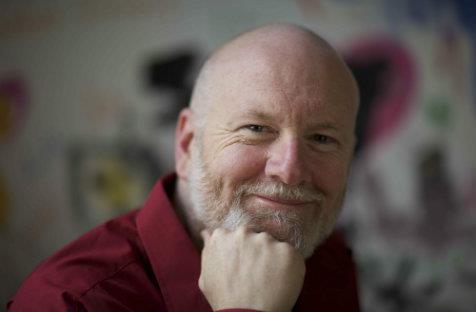Whilst Simone Young conducting the Melbourne Symphony Orchestra in Mahler’s Fifth Symphony is bound to create a buzz of excited anticipation, it was a curious choice of title for this series of concerts, given that the Australian première of a major work by Brett Dean was the other item on the program.
Inspired by paintings by his wife, the artist Heather Betts, Dean’s The Last Days of Socrates is a three-part oratorio for bass-baritone, chorus and orchestra focusing on the trial and death of the Greek philosopher, Socrates. Melbourne poet, Graeme William Ellis, has collaborated with Dean once again, basing his text on the Platonic dialogues in which Socrates argues his case before the court and awaits his death in the company of his followers.
The result is more than 50 minutes of riveting music, which engages the intellect and takes the listener on an endlessly fascinating aural journey. The way Dean balances the three sections of the work and uses complex orchestral effects to heighten the dramatic action creates a sense of mythic power. Openness to the mysteries of life, combined with the struggle of reason against the mental shackles of political control, give the work a timeless resonance. Socrates was accused of ‘corrupting the minds of the young’ and his persecution finds its counterpart in the sufferings of modern dissident artists.
A ritualistic element is established in Part 1, Prelude (Appeal to the Goddess Athena). Hushed percussion was joined by the whisperings of a contingent of violins placed on an upper balcony box. The MSO Chorus had the sole vocal input for this section and impressed with its precision and dynamic control. In Part 2, Apology (The Trial), the chorus is divided into two parts, for and against Socrates and a semi-chorus of tenors and basses act as accusers. Peter Coleman-Wright sang the demanding part of Socrates with an assurance that must spring, at least partly, from his earlier collaboration with Dean on his opera, Bliss. Most of Socrates’ lines are slow, quiet and measured.
As the personification of the voice of reason, Coleman-Wright sang with resonant gravity, conveying a strong sense of philosophical contemplation and stoicism. Dean’s judicious scoring is sympathetic to the needs of the voice and he brings the vocal line to the fore so that due weight and nuance can be given to the text. The beginning of Part 3, Phaedo (The Hemlock Cup), features a cello solo, sensitively played by David Berlin. Timothy Reynolds as a firm-voiced Executioner and the wailings of the off-stage sopranos added much to the emotional intensity. The final passages are ones of affirmation as Socrates reassures his followers, comparing himself to the swan in his acceptance of death with grace. The audience too finds consolation rather than feeling totally crushed by his fate.
Such is Dean’s conceptual imagination and genius for finely textured instrumentation, this can be viewed as a landmark piece that will find its way into the repertoire of many orchestras around the world along with those it was commissioned for: the Los Angeles Philharmonic and the Melbourne Symphony Orchestra.
Simone Young’s careful attention to detail and the shaping of a score was prominent in her interpretation of both Dean’s and Mahler’s compositions. There seemed to be an uncommon degree of buoyancy in her approach, which was especially apparent in the graceful and sometimes delicate Scherzo and in the Rondo-Finale movements of the Mahler. This also became an important factor in maintaining audience interest in a particularly long program.
As with the Dean work, supreme importance was placed on the way sound gradually emerges from the softest pianissimo. Just as the sublime Adagietto (of Death in Venice fame) was about to begin, Simone Young had to turn to the audience to gently request that a whistling hearing aid be attended to. Mobile phones and hacking coughs are not the only aural hazards of the concert hall. Silence established, the unfolding emotion, the surges of passion, the urgency of desire to express the inexpressible and give voice to the ultimate in longing, were all given their full due. The orchestra responded to Young’s rhythmic elasticity, energy and drive with committed playing of a high order – the strings and harp in this movement and brass, winds and percussion in the others. Excellent playing by David Evans as principal horn was a special pleasure. In fact, the whole augmented horn section was impressive. A certain unscheduled inclusion (surname Dean, former member of the Berlin Philharmonic) to the viola section added to the sense of occasion.
Many members of a duly appreciative audience gave a standing ovation at the end of what was a memorable night of music.
Rating: 4 ½ stars out of 5
Simone Young Conducts Mahler 5
Melbourne Symphony Orchestra
Program
Brett Dean – The Last Days of Socrates
Peter Coleman-Wright, baritone
Timothy Reynolds, tenor
Melbourne Symphony Orchestra Chorus
Gustav Mahler – Symphony No. 5 in C sharp minor
Hamer Hall, Arts Centre Melbourne
27 July





